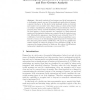20 search results - page 1 / 4 » Subject-independent brain computer interface through boostin... |
ICPR
2008
IEEE
14 years 2 months ago
2008
IEEE
This paper presents a subject-independent EEG (Electroencephalogram) classification technique and its application to a P300-based word speller. Due to EEG variations across subje...
ICRA
2010
IEEE
13 years 6 months ago
2010
IEEE
- This work presents the development of a brain computer interface as an alternative communication channel to be used in Robotics. It encompasses the implementation of an electroen...
TMI
2010
13 years 6 months ago
2010
Abstract— We compared four automated methods for hippocampal segmentation using different machine learning algorithms (1) hierarchical AdaBoost, (2) Support Vector Machines (SVM)...
AICI
2010
13 years 6 months ago
2010
Moving a brain-computer interface from a laboratory demonstration to real-life applications poses severe challenges to the BCI community. Recently, with advances in the biomedical ...
ICPR
2010
IEEE
13 years 7 months ago
2010
IEEE
Automatic analysis of head gestures and facial expressions is a challenging research area and it has significant applications in humancomputer interfaces. In this study, facial la...

